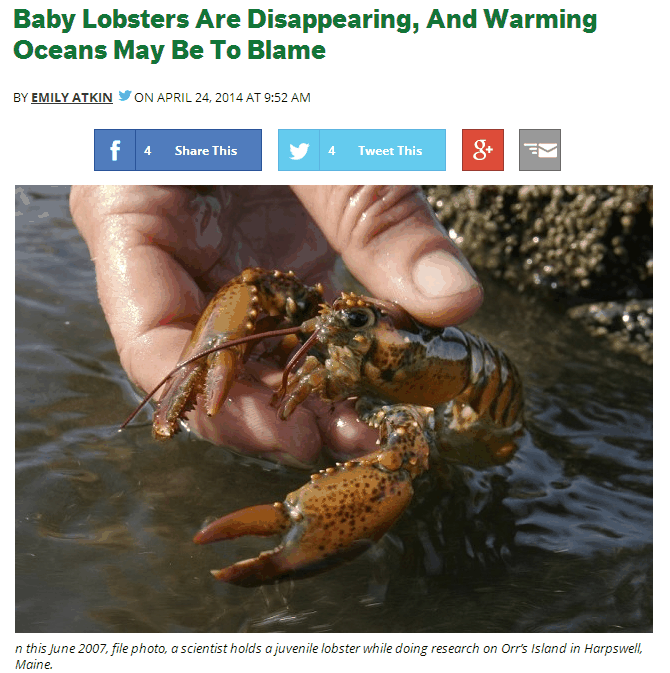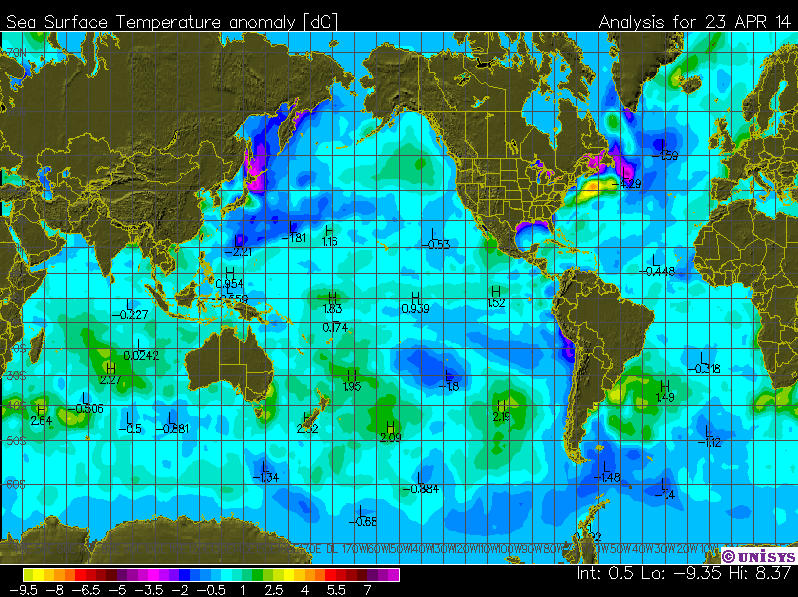Global warming is now targeting a tiny region of ocean off the coast of Maine, causing baby lobsters to disappear.
Baby Lobsters Are Disappearing, And Warming Oceans May Be To Blame | ThinkProgress
You can see the tiny warm spot in the ocean southeast of Maine. CO2 is both sneaky and evil.




Lobsters were so abundant last year they were selling for cheaper than beef here in New York, $3.99/lb, mainly because of the glut of lobsters from Maine.
We call them crawdads. 😉
“Eight years is the amount of time a baby lobster takes to mature to legal harvesting size, so the real dinner table impacts would not likely be felt for at least some time.”
Odd, isn’t it, how all the bad effects are always at least a few years away?
Or maybe they all just swam up to the cold spot by Nova Scotia, since that part of the ocean seems to be doing a better job of keeping the heat buried?
Chip … we have special Canadian water that does a great job of keeping the GLO-BULL warming warmer water buried in the ocean depths. Hockey and heavy warm water … two things we are good at 😉
Thank god we can blame it on global warming because I hate naturally occurring fluctuations in populations, Hopefully lemmings and polar bear populations can be blamed on global warming too.
No man, like, natural variations is just so 1980s.
It’s all climate change now -OK?
No, it’s regulations, all the way down…
A few years ago, lobster prices fell in in the UK, I think due to high supply and they were a very common sight in supermarkets, but recently they seem to be less common.
This graph from wikipedia shows that the lobster catch recently than in the 1980’s (presumably despite increased ocean temperatures.)
http://en.wikipedia.org/wiki/File:Global_capture_production_for_American_lobster.png
This is just another case of if in doubt, “blame it on climate change”.
I love this part “As of now, though, harvests of full-grown lobsters are at an all-time high — which, ironically, is also due to warming waters, Stenck told ThinkProgress back in August” … evil CO2 / GLO-BULL warming is both causing record numbers of lobsters and killing them all. Is there anything that GLO-BULL warming isn’t responsible for … it seems to control everything!!
Take your pick –
http://www.numberwatch.co.uk/warmlist.htm
The article also states:
“Maine lobsters’ eggs hatch in the early summer and larvae swim freely about six to eight weeks before settling at the ocean bottom as inch-long post-larvae.”
What have the average ‘early summer’ water temperatures been for the past few years when eggs were hatching and lobster larvae were developing? I’d bet they’ve been colder than average and will be significantly colder this summer.
I was reading the article and comments over at “Thinkprogress” and was tempted to comment, but it is really too pathetic to get mixed up in. The reported hot spot off the New England coast is (to paraphrase the alarmists) “only a fraction of one percent of the Earth’s surface”! and their comments hold this up as more proof of global warming. You can have a whole continent below average temperature and their response is “but that is only one continent!” You can have 17 years of no warming trend and their response is “but this is only short term, not climate!” On the other hand, you have one tiny warm spot off the coast during a year of abundant lobsters and it is somehow the lobster apocalypse.
Seriously, follow Steven’s link to Think Progress. Read the article and the comments. See if you can read it without visualizing third graders hiding under blankets, telling spooky stories in a darkened room.
It’s all good. The lobsters will be displaced by giant crabs:
http://news.msn.com/science-technology/animals-that-will-thrive-under-global-warming
http://www.washingtonpost.com/national/health-science/2013/04/07/a0c29f48-972f-11e2-b68f-dc5c4b47e519_story.html
http://www.smh.com.au/environment/climate-change/warming-seas-stir-crab-invasion-20130531-2nfjp.html
http://news.nationalgeographic.com/news/2004/03/0309_040309_giantcrabs.html
http://motherboard.vice.com/blog/millions-of-crabs-are-invading-antarctica-right-now
Or maybe not:
http://www.pbs.org/newshour/bb/climate-change-july-dec13-arctic_09-16/
http://wildthings.sarahzielinski.com/blog/if-you-like-to-eat-king-or-snow-crab-worry-about-climate-change/
http://www.pressofatlanticcity.com/science_nature/article_0dfc90d0-c395-11df-973c-001cc4c002e0.html
The witch doctors just can’t seem to make up their minds.
They’re probably disappearing because of Yankee greed and over catching. Look at how polar bear numbers skyrocketed after getting hunting under tight control, even though we experieced global warming.
The over fishing was done by the Japanese, Chinese and Russians. They come in with factory ships and take everything that moves then American fishermen get blamed.
Part of the New England Coast is under both US and Canadian control. The Obama administration shut down the US Sardine Fishery but Candida still cans sardines caught in US waters by US boats and sold to Canadian canneries. The only thing Obama accomplished was to further chill the cold colds hearts of the Luddite Environmentalist faction while destroying American jobs. Do you think that the supposedly new sardine schools are scarfing down the free floating wee baby lobsters?
but Canada still cans….
Alarmists in WA promote the same illogical conclusions about the WA crayfish industry.
http://www.fish.wa.gov.au/Documents/research_reports/frr213.pdf
Page 22:
“3.2 Key environmental trends
Some of the key environmental trends that may be affecting fish stocks of Western Australia include:
(a) increasing frequency of ENSO events;
(b) more years with weaker Leeuwin Currents;
(c) increaseinwatertemperatureoffthelowerwestcoastofWA,particularlyinautumn-winter;
(d) increase in salinity which includes some large annual fluctuations;
(e) change in frequency and location of storms (and rainfall) affecting the lower west coast of WA; and
(f) change in frequency of cyclones (and summer rainfall) affecting the north-west of WA.”
Everyone of these statements is complete rubbish, and yet is gospel at the BOM and UWA.
No one could convince me that little spot on the temperature graphic isn’t some artifact that goes away on the second or third temperature reduction. It isn’t possible.
That cold water to the north also seems to reducing the amount of Arctic melt in that region too.
Andy
If the info is true it is more of an indication of increase in predators mainly cod and haddock whose population has been down